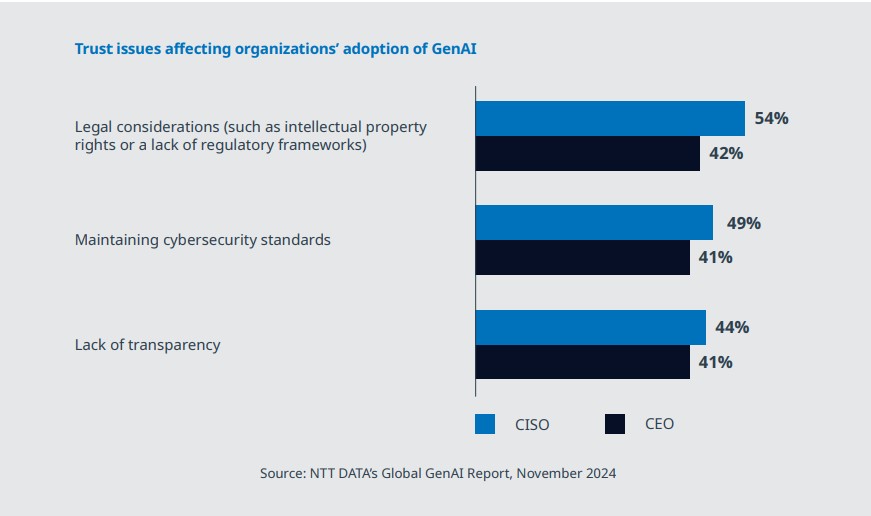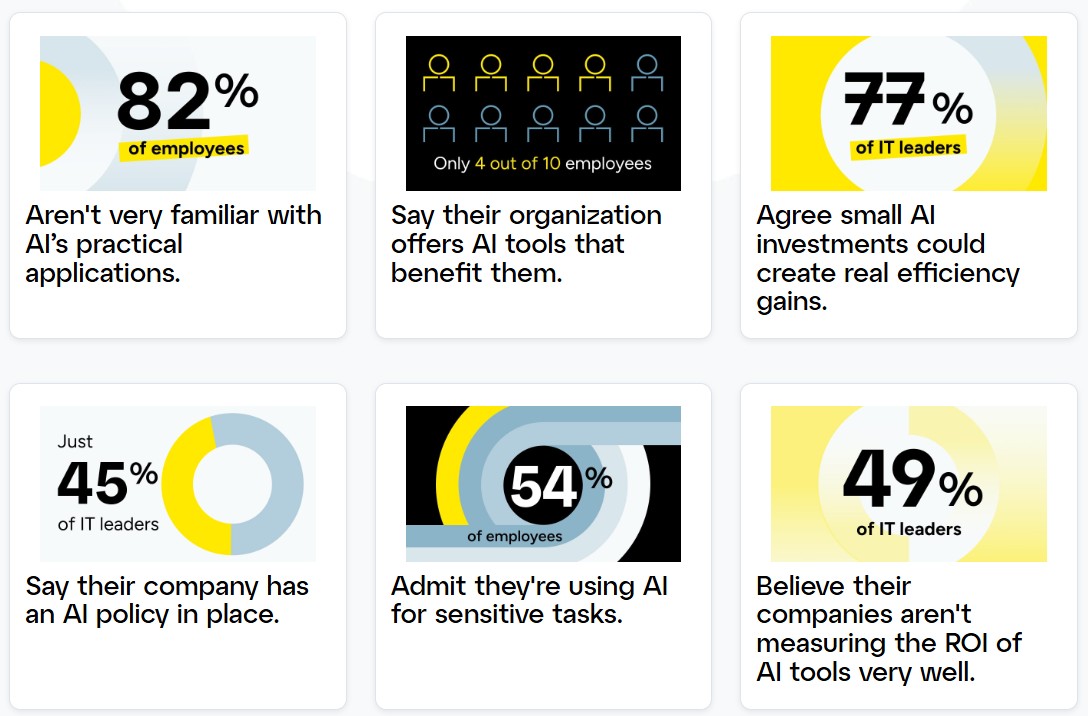
‘Many workers admit they aren’t realizing AI’s full potential or don’t know how to apply it in practical ways’

Business leaders around the world continue to diverge in their views on the adoption of generative artificial intelligence (GenAI) in the workplace, according to a recent report.
More than half (54%) of chief information security officers (CISOs) say internal guidelines or policies on GenAI responsibilities are unclear, yet only 20% of chief executive officers (CEOs) express the same concern, according to NTT DATA.
Despite 97% of CISOs identifying as decision-makers for GenAI, 69% admit their teams lack the necessary skills to effectively work with the technology.
The survey of 2,300 senior GenAI decision-makers across 34 countries also found that just 38% of CISOs say their GenAI and cybersecurity strategies are aligned, compared to 51% of CEOs.
Further complicating adoption efforts, 72% of organisations still lack a formal GenAI usage policy, and only 24% of CISOs strongly agree their organisation has a robust framework for balancing risk with value creation.
This disconnect persists even though many CEOs and CIOs cite the same barriers to adoption.

“Collaboration is highly valued by line-of-business leaders in their relationships with CISOs. However, disconnects remain, with gaps between the organisation's desired risk posture and its current cybersecurity capabilities,” says Craig Robinson, research vice president for security services at IDC. “While the use of GenAI clearly provides benefits to the enterprise, CISOs and Global Risk and Compliance leaders struggle to communicate the need for proper governance and guardrails, making alignment with business leaders essential for implementation.”
Nearly half of security and privacy professionals admit that employees' information are entered into GenAI tools despite organisations' privacy concerns, according to a previous report from Cisco.
Separate research by IT firm GoTo suggests that 62% of global workers believe AI has been significantly overhyped. Their survey of 2,500 global employees and IT leaders found workers estimate they spend 2.6 hours a day—or 13 hours per week—on tasks that could be automated by AI.
Yet, 86% of respondents acknowledge they are not using AI tools to their full potential, and 82% say they’re not very familiar with practical applications of AI in their daily work.
“Employees are already using AI and are seeing clear productivity gains, yet despite these benefits, our latest research shows people still view AI as overhyped,” says Rich Veldran, CEO of GoTo. “While many recognize its value, they don’t yet see it as the revolutionary change they were promised. This gap likely exists because many workers admit they aren’t realizing AI’s full potential or don’t know how to apply it in practical ways.”
Rather than using AI to save time on routine work, 54% of employees admit they’ve applied it to sensitive or high-stakes decisions—such as tasks requiring emotional intelligence (29%), safety implications (25%), and ethical or personnel matters (16%)—despite acknowledging they shouldn’t.
Notably, 77% of those employees say they don’t regret doing so.
A further barrier to wider adoption may be trust: 86% of workers lack confidence in the accuracy and reliability of AI tools, and 76% say the tools often require manual refinement or correction.
Even IT leaders are voicing concerns, despite many CEOs expecting efficiency gains from AI investments, according to the GoTo study.

“The solution is clear: companies must go beyond just providing access to AI by ensuring employees have both the right tools and the right education,” says Veldran. “By equipping teams with effective training and clear guidelines, organisations can empower their workforce to unlock the true, transformational impact of AI.”
Despite the continued popularity of AI among Canadians CEOs, few have been able to adopt the technology throughout their organisation, according to a previous IBM report.
Despite the challenges, businesses continue to pursue GenAI's potential, according to NTT Data.
Nearly all (99%) of C-suite executives are planning further GenAI investments within the next two years, with 67% of CEOs planning significant commitments.
Moreover, 95% of chief information officers (CIOs) and chief technology officers (CTOs) say GenAI has already triggered—or will soon trigger—enhanced cybersecurity investments. Improved security ranked among the top three business benefits from GenAI deployment in the past year.
Even among senior IT security leaders sceptical about GenAI, 81% still agree it will improve efficiency and profitability.
“As organisations accelerate GenAI adoption, cybersecurity must be embedded from the outset to reinforce resilience. While CEOs champion innovation, ensuring seamless collaboration between cybersecurity and business strategy is critical to mitigating emerging risks,” says Sheetal Mehta, senior vice president and global head of cybersecurity at NTT DATA. “A secure and scalable approach to GenAI requires proactive alignment, modern infrastructure and trusted co-innovation to protect enterprises from emerging threats while unlocking AI’s full potential.”
Over nine in 10 (91%) middle market companies are now using GenAI in their business operations, a sharp increase from 77% reported last year, according to a previous report.